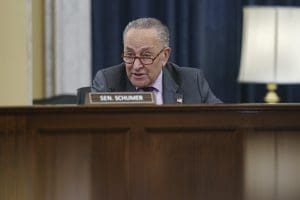Schumer finds loophole that would actually let the Senate get stuff done
Democrats have a potential path forward to pass legislation despite GOP stonewalling.

A ruling by the Senate parliamentarian has given Democrats an opportunity to pass more fiscal legislation without facing a Republican filibuster, giving them the chance to pass some of President Joe Biden’s agenda.
Senate rules allow the minority party to block most legislation unless it enjoys three-fifths support, or 60 votes in the 100-member chamber. But an exception, known as budget reconciliation, allows senators to pass bills that are mostly about revenue and spending with a simple majority.
In the past, this has been limited to one package per fiscal year. But Senate Majority Leader Chuck Schumer found a loophole in this rule, realizing that if the majority decides to amend its reconciled budget in the same fiscal year, it can do so through the same process. On Monday, the Senate’s parliamentarian agreed with the New York Democrat’s interpretation, setting up multiple chances to use the rule annually.
“The Parliamentarian has advised that a revised budget resolution may contain budget reconciliation instructions. This confirms the Leader’s interpretation of the Budget Act and allows Democrats additional tools to improve the lives of Americans if Republican obstruction continues,” a Schumer spokesperson said in a statement, calling the opinion “an important step forward that this key pathway is available to Democrats if needed.”
The ruling provides a path forward for the majority party as Senate Democrats prepare for the possibility that they may have to pass President Joe Biden’s American Jobs Plan proposal to invest $2.25 trillion in infrastructure over the next decade through the budget reconciliation process to circumvent unanimous GOP opposition.
The Senate majority may now be able to pass several of Biden’s other proposals and key Democratic priorities despite Minority Leader Mitch McConnell’s objections.
Policies concerning immigration and health care that have an affect on the budget could be the subject of future reconciliation bills.
Some Democrats have urged using the process to pass the Dream Act, which would provide a pathway to citizenship for undocumented immigrants brought to the United States as children, and legislation to provide green cards for undocumented farmworkers. The House passed both of those bills in March, but they face an uphill battle to get 60 votes in the Senate, where even previous GOP backers of immigration reform are signaling they will not support it this time.
Democrats could also potentially use reconciliation to pass fixes to the Affordable Care Act, create a public option to compete with private health insurance plans, and lower prescription drug costs through Medicare bulk purchasing.
They could also pass additional infrastructure investments, tax policy changes, and spending changes.
But there are limits to what can be done using the process. The Senate’s longstanding “Byrd rule” prevents “extraneous matter” from being included in budget reconciliation, such as policies that have little to do with revenues or outlays.
Biden’s proposal for a gradual increase in the federal minimum wage up to $15 an hour was not allowed to be included in the $1.9 trillion American Relief Plan when the Senate passed it in March.
Additionally, using the reconciliation process can be time-consuming and can be slowed by opposition maneuvers. Republicans led by Wisconsin Sen. Ron Johnson used stalling tactics to waste hours of the Senate’s time during the pandemic relief bill debate, including forcing clerks to read hundreds of pages aloud and demanding roll call votes on dozens of amendments.
Even with reconciliation, the Democratic majority will likely need to be unified to pass anything. With just 50 seats in the Senate and Vice President Kamala Harris having the authority to cast tie-breaking votes — and Republicans so far showing little interest in cooperation — Democrats will need to vote unanimously for any legislation they hope to pass.
Published with permission of The American Independent Foundation.
Recommended

Biden calls for expanded child tax credit, taxes on wealthy in $7.2 trillion budget plan
President Joe Biden released his budget request for the upcoming fiscal year Monday, calling on Congress to stick to the spending agreement brokered last year and to revamp tax laws so that the “wealthy pay their fair share.”
By Jennifer Shutt, States Newsroom - March 11, 2024
December jobs report: Wages up, hiring steady as job market ends year strong
Friday’s jobs data showed a strong, resilient U.S. labor market with wages outpacing inflation — welcome news for Americans hoping to have more purchasing power in 2024.
By Casey Quinlan - January 05, 2024
Biden’s infrastructure law is boosting Nevada’s economy. Sam Brown opposed it.
The Nevada Republican U.S. Senate hopeful also spoke out against a rail project projected to create thousands of union jobs
By Jesse Valentine - November 15, 2023








































































